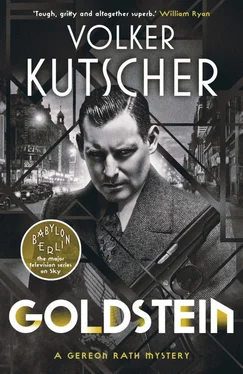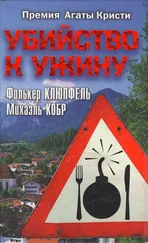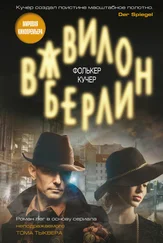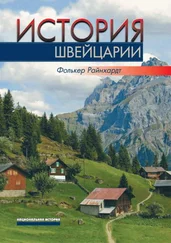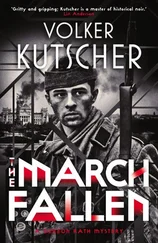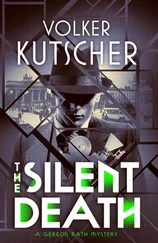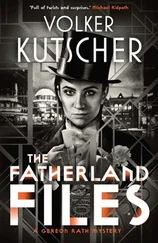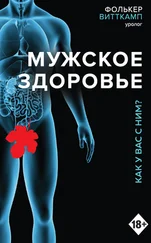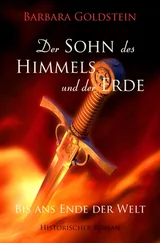At length Marlow agreed. Another hurdle cleared, but it was the next one that mattered most.
In Saint Norbert’s, Rath came upon Pastor Warszawski, but the man was not inclined to cooperate. ‘I thought you’d be back,’ he said. ‘Which is why I took the necessary precautions.’
‘Goldstein’s no longer here?’
‘Of course not.’
‘Where is he?’
‘Why should I tell you? Why do you suppose he’s no longer here?’
‘Could it be that you don’t trust me?’
‘I trust in God, not in people. Tell me where he can reach you and I’ll set everything in motion.’
‘I don’t have much time, damn it! Someone’s life is at stake.’
‘Then you’ll have to explain.’
Rath explained.
It wasn’t a particularly original hideout, but it was unlikely they’d have found Goldstein without the help of the Catholic Church. Pastor Warszawski insisted on accompanying Rath personally. A seed of distrust remained. They drove southwest along the Reichsstrasse 1, turning left just before Zehlendorf. As they reached a peaceful, green street, the pastor told Rath to stop. On one side were nice little houses with gardens, on the other a seemingly endless green hedgerow.
‘The Abendruh allotment gardens,’ Warszawski explained. ‘I have a plot here.’
Rath parked the Buick outside a pretty, detached house, the kind he always dreamed about owning, but knew he’d never be able to afford without inheriting his parents’ estate. The hedgerow on the other side was broken at regular intervals by entranceways. Behind it he saw trees, shrubs, flagpoles and the roofs of allotment sheds: the classic hideout in a city like Berlin. It was nigh-on impossible to find anyone here if you didn’t already have a lead, or a resident who’d reported something suspicious.
The allotment gardens were huge. Rath followed the pastor along a path that was straight as a die, with hedgerow on both sides. After making a few turns, always at a right angle, now to the right, now to the left, he began to feel as if he were in a maze belonging to a baroque castle estate. Warszawski came to an abrupt halt.
‘Here it is,’ he said, though he didn’t seem too comfortable about it.
Barely two hours later, a truck, four green Opels from the motor pool and, lastly, the black murder wagon drew up in Elmshorner Strasse. Uniformed officers sprang from the truck and moved on the allotments using three parallel paths. A group of plainclothes CID emerged from the Opels. Ernst Gennat climbed out of the murder wagon, followed by Wilhelm Böhm.
On their way out west they had been caught in rush-hour traffic, but decided against using the sirens for fear of attracting attention. Rath cursed his luck; every hour Charly spent in the grip of Tornow and his men was one too many. He had to pass the whole journey sitting next to Sebastian Tornow and would have liked nothing more than to ram his fist into the man’s face. Tornow behaved as if nothing had happened between them. Still, Rath had done his best to avoid talking to the man, indeed, had barely even looked at him. Gräf observed the inspector’s reticence, and no doubt put it down to their conversation in the Nasse Dreieck , which was a good thing, although it meant the detective was suffering from a guilty conscience. Gennat had alerted all officers working on the Goldstein case, as well as any murders the gangster was apparently responsible for, more or less exactly the investigations named by Tornow hours before.
Rath and his men made for Pastor Warszawski’s shed along the middle path, where Wilhelm Böhm awaited them, a bastion of calm. In his hand he held a megaphone.
‘Rath and Tornow, you stay out here,’ he barked. ‘Goldstein has already given you the slip once. Let’s not make it a second time. He knows your faces.’ The Bulldog pointed towards Gräf. ‘He knows you from the hotel, too.’
The rest of the CID officers were allowed past. Rath was familiar with the plan of action thanks to the briefing Gennat had held before they set off. First anti-riot police would surround the area, taking cover behind the hedgerow. To the right and left of the plot gate, two officers would be stationed with firearms at the ready. Buddha had warned them to make use of their weapons only in case of emergency. He and Böhm were the only CID officers on the front line; those left over would be deployed to help Uniform keep overly curious gardeners away from the operation.
Rath, Gräf and Tornow were the only officers stationed outside who weren’t in uniform, and held themselves apart. They had even less to do than the uniform cops monitoring the entrances to the allotments. Most used the lull for a cigarette break, Rath likewise.
‘If all we’re doing is standing around, then why are we here at all?’ Gräf said in irritation, returning to the Opel in which they had arrived. Rath was about to follow when Tornow addressed him. ‘Nervous?’ he asked.
‘Do I look it?’
‘Yes.’
‘It’s because I’d like to know when you’re going to release her.’
‘As soon as I’m certain that Abraham Goldstein is actually in there, and we lay our hands on him.’
‘You don’t trust me?’
‘All this happened pretty fast.’ Tornow smiled. ‘Either you knew where Goldstein was hiding and decided to keep it to yourself, or this is just a massive ruse and the only things we’ll be digging up here are molehills.’
‘Just wait,’ said Rath, who was still thinking of socking Tornow one. Instead he threw his cigarette on the asphalt and trod it out, as if it were a poisonous spider. Or Tornow’s smile. ‘You still haven’t told me why,’ he said. ‘Why did Lenz and Höller have to die?’
Tornow’s smiled vanished. ‘Best you don’t know too much about that. Not that they’ll be missed. They were career criminals. The whole world knew it, yet no one was willing to take them to court.’
‘Kuschke wasn’t a career criminal. He was a cop.’
‘Perhaps he made other mistakes.’
‘Like leaving a witness behind?’
‘Like I said, there are certain things it’s better you don’t know.’
Böhm’s voice was distorted and amplified by the megaphone.
‘Attention! This is the police! Abraham Goldstein, we know where you are hiding. Come out with your hands up. Resistance is futile; the site is surrounded on all sides.’
For what felt like half an age they heard nothing, and Rath prayed it would all go according to plan. He couldn’t help thinking about Charly; her life depended on the scheme he had hatched together with Gennat.
At times she couldn’t remember where she was, or who was questioning her. She just knew that someone was always questioning her, that they hadn’t granted her a single break. There was always at least one man asking questions, sometimes more. She found it harder and harder to concentrate. Sometimes she saw men who weren’t there at all, more and more often something flashed at the edge of her vision: a familiar face, a man in a red pullover. On one occasion she thought she saw Gereon. Fatigue dragged her down like a dead weight, but still they wouldn’t let her sink to the floor. Again and again she was forced to struggle against the burden of her exhaustion. She could no longer say how long this had been going on. Hours, days, weeks might have passed.
Her cheeks stuck to her gums because they weren’t giving her enough to drink. Only when she was no longer capable of speech did they allow her a sip of water. In the meantime she got the hang of simulating a dry mouth, since not all the guards were so strict. Some were a little quicker to show compassion, and one had even let her nod off for a moment before waking her. Others shouted at her constantly, beating their fists against the table to intimidate her.
Читать дальше
